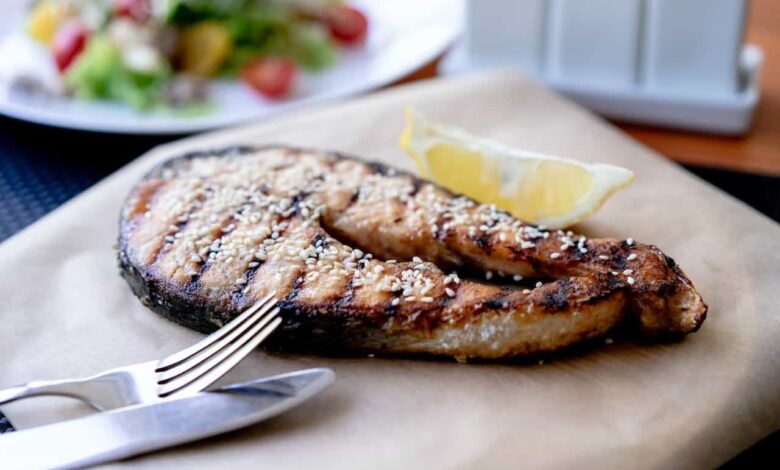Safety of Smoked Salmon for Babies: Suitable Ages and Varieties

When it comes to introducing solid foods to babies, parents often seek a delicate balance between nutritional benefits and potential risks. Smoked salmon, a delicacy enjoyed by many adults, raises questions about its suitability for infants. In this comprehensive guide, we will explore the safety aspects of offering smoked salmon for babies, covering suitable ages and varieties. Our aim is to provide clear insights, ensuring parents can make informed decisions about incorporating this flavorful fish into their little one’s diet.
Understanding the Appropriateness of Hot Smoked or Cooked Salmon for Infants

Introduction to Hot Smoked Salmon
Hot smoked salmon is a popular preparation method that involves cooking the fish at higher temperatures, imparting a rich and smoky flavor. For parents considering introducing their babies to this culinary delight, it’s essential to focus on the appropriate age range. Pediatric experts suggest that hot smoked salmon can be introduced to infants around 6 to 8 months of age, when they start transitioning to solid foods.
Nutritional Benefits
Hot smoked salmon is a nutrient-rich option, providing essential omega-3 fatty acids, high-quality proteins, and a range of vitamins and minerals crucial for a baby’s growth and development. The omega-3 fatty acids, particularly DHA, play a vital role in supporting brain and eye development, making hot smoked salmon a valuable addition to a baby’s diet.
Safe Preparation and Serving Tips
To ensure the safety of hot smoked salmon for babies, it’s crucial to follow proper preparation and serving guidelines. Opt for reputable sources to purchase salmon, and ensure it is fully cooked to eliminate any potential health risks. Cut the salmon into small, manageable pieces to prevent choking hazards, and always supervise your baby during mealtime.
Cold Smoked Salmon and its Compatibility with Babies
Understanding Cold Smoked Salmon
Cold smoked salmon, another popular variation, undergoes a different smoking process at lower temperatures, preserving the fish while giving it a distinctive, silky texture. When considering its compatibility with babies, caution is necessary due to potential risks associated with raw fish consumption.
Suitable Age Range
Pediatricians recommend introducing cold smoked salmon for babies at a later stage, typically around 12 to 24 months. Waiting until the child’s immune and digestive systems are more robust can help minimize the risks associated with consuming raw fish.
Potential Risks and Precautions
While cold smoked salmon offers a unique flavor profile, parents should be aware of potential risks such as exposure to harmful bacteria. To mitigate these risks, it’s advisable to purchase high-quality, reputable brands and confirm that the product has undergone rigorous safety measures during processing. Additionally, always consult with your pediatrician before introducing any new foods to your baby’s diet.
FAQ’s
Can I Introduce Smoked Salmon to My Baby’s Diet?
It’s recommended to wait until your baby is at least 12 months old before introducing smoked salmon. This allows their digestive system to develop, reducing the risk of potential allergies or sensitivities. Consult with your pediatrician before including smoked salmon in your baby’s diet.
Is it safe to eat Smoked Salmon for Babies Due to the Risk of Listeria?
Babies are more susceptible to foodborne illnesses, and smoked salmon carries a risk of Listeria contamination. It’s crucial to choose high-quality, reputable sources for smoked salmon and ensure it’s properly refrigerated. Heat-treated or pasteurized options may be a safer choice for infants.
How Should I Prepare Smoked Salmon for My Baby?
When introducing smoked salmon to your baby, ensure it is finely flaked or pureed to reduce the risk of choking. Remove any skin, bones, or additives, and avoid adding salt or other seasonings. Serving small, age-appropriate portions is key to monitoring your baby’s response to this new food.
Are There Nutritional Benefits to Including Smoked Salmon in My Baby’s Diet?
Smoked salmon is a good source of omega-3 fatty acids, which play a crucial role in brain development. Additionally, it provides protein, vitamin D, and other essential nutrients. However, it’s important to balance smoked salmon with a variety of age-appropriate foods to ensure your baby receives a well-rounded diet.
Can I Include Smoked Salmon in Baby-Led Weaning?
While baby-led weaning encourages self-feeding with age-appropriate finger foods, smoked salmon may pose a choking hazard due to its texture. If you choose to introduce smoked salmon during baby-led weaning, ensure it’s prepared in a way that minimizes choking risks, and closely monitor your baby’s ability to handle this food. Always follow your pediatrician’s advice on introducing new foods during weaning.
Conclusion: For parents seeking a balance between culinary delights and their baby’s well-being, understanding the nuances of smoked salmon varieties is crucial. By following recommended age ranges and safety precautions, parents can confidently include smoked salmon in their baby’s diet, offering a flavorful and nutritious experience.
- Explore a thoughtfully curated assortment of articles showcased on our homepage, meticulously designed to lead you toward improved health and overall well-being.




